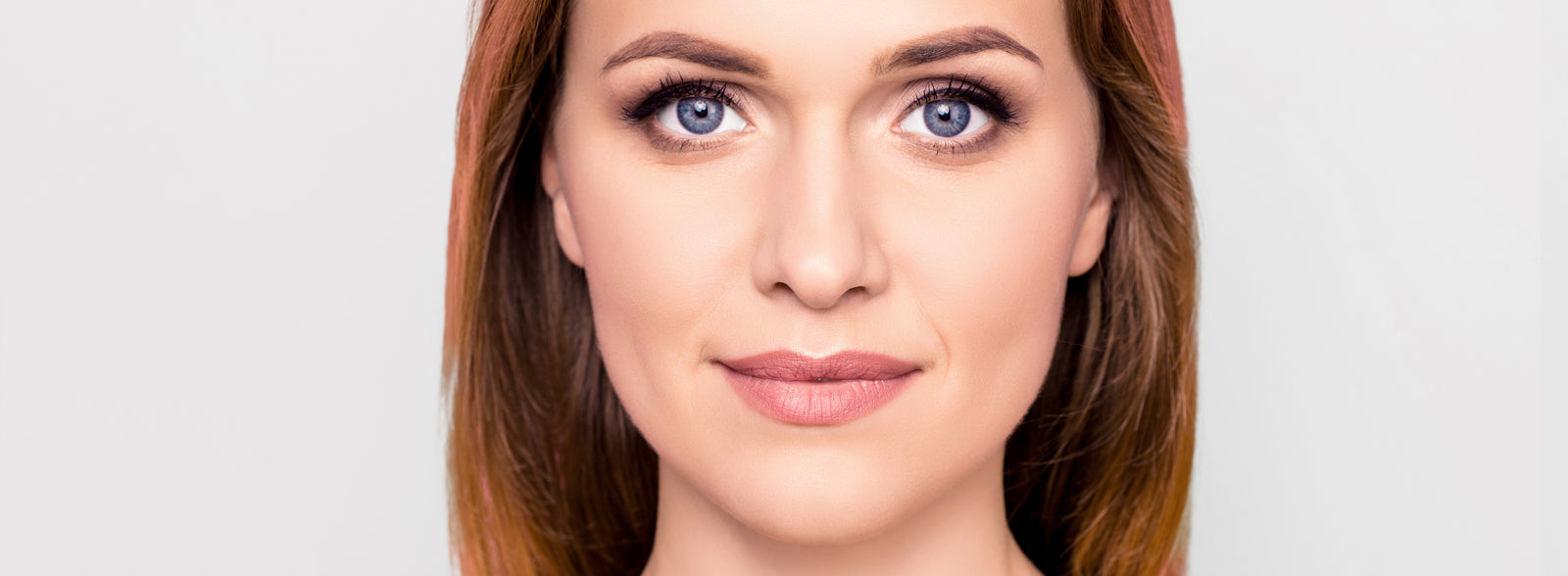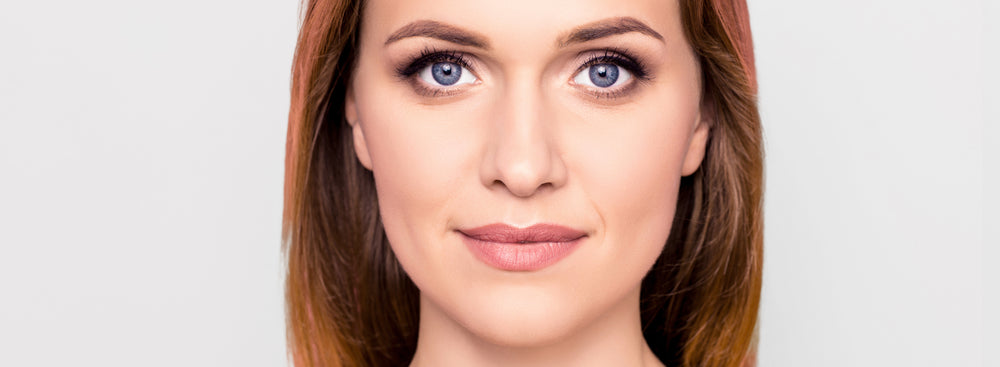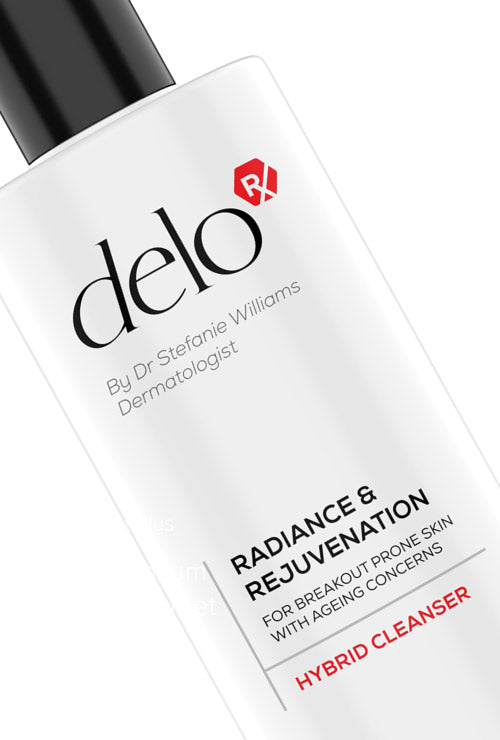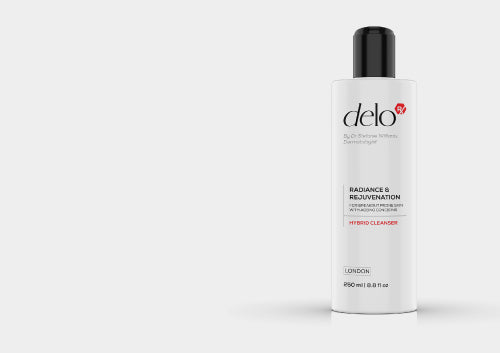Please note: the information on this website is not meant as medical advice in any shape or form. It is purely an educational resource. Please speak to your doctor for medical advice.
-
WHAT CAUSES BREAKOUTS IN ADULT SKIN?
There’s no one specific cause of adult breakouts, as they can be related to several skin conditions such as acne, rosacea and periorificial dermatitis (POD), to name the three most common causes (with adult acne and rosacea leading the way).
Before we talk about these three in a bit more detail, it's firstly very important to acknowledge that the two most common conditions - namely adult acne and rosacea - are chronic skin conditions, not just self-limiting disorders that one has to endure for a short period of time. Recognising the chronicity of adult acne and rosacea also means that maintenance treatment and using the right skincare is integral for the management of these conditions.
Acne and rosacea are very common skin health issues affecting the female face. They can both present as inflamed breakouts of pimples and spots. Because both acne and rosacea can show up with spots, it is not uncommon that they are mixed up by laypeople and general healthcare professionals alike. In addition to these inflamed lesions, we need to look for some other symptoms which are more specific to either acne or rosacea. For acne, blackheads and whiteheads, medically known as comedones (laypeople may call them ‘congestion’) are a typical feature. With rosacea, we look for tiny broken capillaries, known as teleangiectasias and ask about facial flushing, which are all common features in rosacea prone skin (‘vascular rosacea’). However, it’s also possible to suffer with an overlap of both adult acne and rosacea.
Acne
Acne is one of the most common skin health issues dermatologists see. And we are increasingly seeing cases of adult acne which can persist into your 30s, 40s and beyond (or only start in your adult years). Sadly, even mild acne can have a significant negative impact on confidence.
You might think to yourself, “oh it’s only a couple of spots, it can’t be acne”. People commonly assume only very severe cases of pimples are considered acne. In fact, acne is merely a medical term for spots, pimples, blackheads and whiteheads, and the term itself has no relationship to the severity of the breakout.
Rosacea
Rosacea is another common facial skin problem in adult women. It’s easy to mistake with acne, both by patients and general healthcare professionals. Rosacea is more common in women than men and those fair-skinned types among us are particularly susceptible, that’s why it’s also known as the ‘curse of the Celts’, but any skin type can develop rosacea.
Rosacea can also show up with vascular changes such as redness, flushing and broken capillaries, either with or without inflamed spots such as papules, pustules, ‘bumps’ and ‘blotches’. Rosacea itself does not come with comedones (blackheads and/or whiteheads), as mentioned, but of course there may be an overlap with acne.
Less commonly, rosacea might also affect the eyes, causing them to become dry and gritty-feeling and the lids may become inflamed. The skin on the nose or other facial skin areas may in rare cases develop into a condition called phymatous, where the skin reddens and thickens, and pores appear enlarged. On the nose, we call this rhinophyma and if you’re familiar with the medical name for a nose job, you’ll understand why (‘rhino’ means nose in Ancient Greek).
Rosacea often appears mid-life, but this is not a given, it can appear earlier or later, too. Even if you never had acne as a teen, rosacea can come up later in life: patients often report being clear-skinned teens yet, now they’re in their forties, they’re seeing not only lines and wrinkles appearing, but also breakouts; not fair!
POD
Coming in at third place for most common skin conditions causing breakouts in adult women is POD. POD was traditionally called perioral dermatitis, which refers to a rash around the mouth (‘oris’ means ‘mouth’ in Latin). But we sometimes also see the condition in other facial skin areas such as around the nose and eyes, so it’s now more accurately called periorificial dermatitis, meaning a rash around facial openings such as mouth and nostrils (‘orificium’ is Latin for ‘opening’).
POD is characterised by groups of tiny red bumps and is often accompanied by flaking. In contrast to acne and rosacea, this rash may feel a little itchy and the skin often feels tender, burning or tight. POD is more common in women than men and usually occurs in adults. POD can be caused by over-using rich skincare, neglecting to wash the face properly or using wet wipes instead of washing with water. Topical, inhaled or nasal corticosteroids can potentially also cause POD.
-
WHY IS IT SO IMPORTANT TO TREAT BREAKOUTS?
It’s important to deal with breakouts early and properly for a number of reasons. Firstly because ‘bad’ skin tends to make people feel terrible and is known to affect quality of life. In fact, scientific studies prove this, demonstrating breakouts can cause anxiety, social withdrawal, low self-esteem and even depression. It’s clear breakouts negatively affect psychological and emotional functioning. Interestingly, the objective severity of the breakout is not correlated to the extent of psychological symptoms, as studies revealed. What this means is that even mild breakouts can take a psychological toll.
There are other studies that found wearing make-up significantly improves the quality of life of breakout sufferers. Thank you, captain obvious I hear you say. But who wants to have to wear make-up every day? Wouldn’t it be incredible to feel confident going out to lunch or catching up with friends without feeling like you had to cover up your breakouts first? Nobody should have to wear make-up to make themselves feel better.
Another very important reason to tackle acne breakouts as early as possible is scar prevention. Acne breakouts can potentially leave life-long scarring of the skin. Just like active breakouts, scarring can cause significant psychological stress, but it’s much harder to treat. Once scarring is present, it’s much more difficult to restore the skin’s smoothness and chances are very high that it will never be perfect.
That’s why we feel so strongly about helping breakout sufferers and why it is so important to get the right help and use the right products early on. We will talk about when to see a doctor with breakout and when to try over-the-counter options below. -
WHEN SHOULD I SEE A DOCTOR ABOUT MY BREAKOUTS?
Breakouts can be caused by a range of different underlying skin conditions including adult acne, rosacea and perioral/periorificial dermatitis (POD). All of these may benefit from medical treatment prescribed by a doctor, ideally a dermatologist. For that reason, seeing a doctor with your breakouts to discuss potential prescription treatment is never a bad idea.
However, if you suffer from only mild breakouts, there is no scarring and you would like to try something over the counter first, by all means, give it a go to see if it helps. However, our recommendation is to see a doctor if over the counter products haven’t improved your skin after about three months.
And, if you suffer from acne scars, painful bumps or deep cysts, you should see a doctor, ideally a dermatologist, straight away.
In any case, if you’re blemish prone and not paying attention to your skincare, you’re making a huge mistake, as the wrong type of skincare can not only aggravate breakouts in blemish prone skin, but also slow down or even undo the good your prescription treatment is doing. -
HOW ARE BREAKOUTS IN ADULTS DIFFERENT FROM TEENAGE BREAKOUTS?
There are distinct differences between acne in adult women, compared to typical teenage acne. Their skin can behave very differently. For teenage acne, the skin is usually on the oily side with lots of blackheads and whiteheads (so-called comedones). In this case, the skin benefits from stripping away some of those excess oils, but this often doesn’t work for adult women. Adult women’s skin tends to be less oily and more sensitive, which needs to be taken into account. So, most adult women with breakouts need to deal with their acne breakouts differently to when if they were a teen.
Adult women need a different approach which deals with their skin’s unique needs and also factors in other possible concerns such as anti-ageing and irregular pigmentation.
Also – their breakouts may not even be acne! Instead, they may be caused by a different condition such as rosacea, common in middle-aged women, or a less common condition called periorificial dermatitis. All three of them can appear with spots. -
WHAT ABOUT ADULT MEN – CAN THEY USE DELO RX PRODUCTS?
While breakout prone adult women tend to have less oily and more sensitive skin compared to teenagers suffering with breakouts, adult men with breakouts have on average more oily skin compared to women. However, that does not mean that Delo Rx skincare products are not suitable for men!
If you are an adult male breakout sufferer with not overly oily skin, then by all means, Delo Rx is great for you, too! If, however, you have very oily and non-sensitive skin, you may benefit from something a little stronger, as Delo Rx has been specially developed for the more sensitive breakout prone skin typical for adult women. -
CAN I USE DELO Rx IF I DON’T SUFFER WITH BREAKOUTS?
Yes, absolutely. Delo Rx is a high-grade cosmeceutical skincare range that has been specially developed to support your skin to stay healthy, youthful looking and beautiful long-term. So, many people use is, because it’s simply an amazingly advanced anti-ageing range to support your skin as best as you can to age well. Many women love Delo Rx not only because of its advanced ingredients, but also for its elegant, lightweight, grease-free, clean formulations.
This is also one of the reasons why many men choose Delo Rx to other anti-ageing skincare, as they prefer how its lightweight formulations feel on the skin, while knowing it’s dermatologist developed, aiming to provide all the skin needs to stay healthy and beautiful longterm.
The lightweight, clean formulations are also the reason why people in hot climates like LA may prefer Delo Rx to other anti-ageing ranges. The products simply have a global feel and consistency working well even in hot climates. -
HOW CAN I DISTINGUISH ACNE AND ROSACEA?
Both acne and rosacea are skin conditions that can appear with breakouts such as pimples and spots known as inflammatory lesions. There are, however, some symptoms more specific to either acne or rosacea to help us tell them apart.
Blackheads and whiteheads, known as comedones, are typical for acne, whereas vascular changes such as flushing and tiny little broken capillaries, called teleangiectasias, are more typical for rosacea. It is totally possible, however, to suffer with an overlap of both acne and rosacea!
When the condition first appears is also often different for acne and rosacea. Acne typically first appears in the teenage years. Rosacea, on the other hand, tends to rear its head in mid-life, usually mid-30s or 40s. Of course, there are countless women in their 30s, 40s and beyond suffering with adult acne (and we’re seeing increasing numbers of these women) or even just started suffering with adult acne in the adult years, just as there are women in their 20s suffering with rosacea.
A dermatologist can help to diagnose what skin condition you are suffering with, if you are unsure. -
IS IT POSSIBLE TO SUFFER WITH BOTH ACNE AND ROSACEA AT THE SAME TIME?
Yes, a clinical overlap of adult acne and rosacea is not uncommon. In fact, the founder of Delo Rx, Dr Stefanie Williams, also suffers with both.
-
WHEN ARE BREAKOUTS CALLED ‘ACNE’?
Patients often feel their breakouts are too minor to be called ‘acne’, as they’re picturing a poor teenager with red, pussy lumps all over their face. However, acne is merely the medical term used for spots, pimples, blackheads and whiteheads and doesn’t take into account severity. Any acne pimple, no matter how small, is called ‘acne’.
-
I STILL GET SPOTS, BUT AM NOW SEEING WRINKLES, TOO – IT’S NOT FAIR, WHAT CAN I DO?
You’re right, it’s not fair at all. But, if you suffer with breakouts in your adult years and are also concerned with lines, loose skin, irregular pigmentation or other signs of ageing, there is help.
The good news is that a well formulated skincare range such as Delo Rx, can help with both blemishes as well as skin ageing, as some ingredients such as certain types of retinoids (vitamin A derivatives) can address both.
Unfortunately, many traditional anti-ageing products may aggravate breakouts, as they are typically formulated with non-breakout prone dry skin in mind. They tend to be overly rich, clogging pores and ‘suffocating’ (occluding) the skin, often containing high levels of silicone derivatives, oils and other oil-loving ingredients, which in Dr Stefanie’s professional opinion should be strictly avoided in breakout prone skin, even if may feel subjectively dehydrated or dry.
Delo Rx is different. It’s an advanced anti-ageing skincare range specially formulated with breakout prone, yet more sensitive skin in mind. It’s low in oils and silicones and high in gentle pore-unclogging as well as ultra-calming ingredients.
Also, remember, in breakout prone skin, often what feels like ‘dry skin’ may actually be a sing of micro-inflammation in the skin rather than true dryness. -
I DON’T HAVE WRINKLES YET, BUT WANT TO PREVENT THEM – CAN I USE DELO Rx?
Absolutely. Delo Rx is a high-grade cosmeceutical skincare range that has been specially developed to support your skin to stay healthy, youthful looking and beautiful long-term.
The ingredients have been chosen for helping to slow down skin ageing, so whether you want to soften existing lines, or simply protect your skin and prevent, Delo Rx is a good choice. -
WHY IS THE RIGHT SKINCARE IMPORTANT FOR BLEMISH PRONE SKIN?
When treating breakouts, whether that’s with or without prescription treatment from your doctor, it’s vital to consider your skincare and use an optimised regime, as using the wrong type of skincare can aggravate breakouts and also make them less responsive to prescription treatment.
We are always shocked to discover how many GPs and dermatologists don’t talk about skincare with their breakout patients. To us, that’s the equivalent of an endocrinologist ignoring what a diabetic patient eats and not sending them to a nutritionist for advice. The wrong skincare can aggravate or even cause breakouts, so if you are blemish prone, it’s important to use the right skincare products. -
HOW IS DELO Rx DIFFERENT TO MANY OTHER BLEMISH SKINCARE PRODUCTS ON THE MARKET?
Delo Rx has been developed by leading dermatologist Dr Stefanie Williams, a cosmetic dermatologist with special interest and expertise in dealing with breakout prone skin. Her special interest for helping breakout prone women may also stem from her personal experience, suffering with an overlap of adult acne and rosacea.
In Dr Stefanie’s professional experience, most skincare products on the shelves, even many of those specifically marketed for blemish prone skin, are not ideal or even wholly unsuitable for breakout prone skin. That may be because cosmetic scientists who formulate skincare in the lab haven’t actually treated breakouts hands-on in clinic, as a dermatologist has. -
HOW QUICKLY CAN I GET RID OF MY BREAKOUTS?
Firstly, we want to stress that breakouts are usually a chronic skin issue, so while we can manage them well with the right type of approach, your skin will in most likelihood need an ongoing maintenance regime to keep it clear. If you were to just go back to unsuitable skincare, your blemishes may very likely come back, because we can’t switch of your genetic predisposition for breakouts.
Secondly, breakouts are known respond rather slowly. Generally speaking, we always recommend trying a regime for about three months before judging it, so don’t become impatient. Good results often take around three months with optimal response often occurring at around six months. That’s completely normal. -
CAN ADULT BREAKOUTS BE CURED?
Not cured as such, but managed really well. The vast majority of adult breakouts are considered chronic skin conditions, which means they can be managed well, but may reoccur under certain conditions. Various factors will influence your skin condition, including your genetics, hormones, environmental factors, diet, skincare as well as stress and emotional wellbeing.
The good news is that there are effective treatments available and if managed well, others may not even realise you’re breakout prone. -
WHAT IS THE MOST COMMON MISTAKE BREAKOUT SUFFERERS MAKE?
Incorrect skincare! Using the wrong skincare products when you are suffering with breakouts can damage your skin's wellbeing and aggravate the problem. This is why it is vital to optimise your skincare, whether or not you are using prescribed treatment from your doctor.
Even if you are not using or no longer need prescription treatment, it is still important to keep using an optimal skincare regime, as it will help maintain your treatment success. -
MY BREAKOUTS ARE MAKING ME SO UPSET, SOMETIMES I DON’T WANT TO LEAVE MY HOUSE. IS THIS NORMAL?
You are not alone. Many women with breakout prone skin feel this way. That’s why we are so committed here at Delo Rx to finding the best solution for your skin concerns. We want you to feel proud of your skin and confident again.
-
DO I NEED PRESCRIPTION TREATMENT FOR MY BREAKOUTS?
That depends on your particular skin and the severity of your breakouts. If you suffer with mild to moderate breakouts, then a good skincare regime may be able to keep your breakouts at bay and clear your skin.
Delo Rx has been specially designed with adult breakout prone skin in mind. However, should your breakouts not have improved after about 3 months of using over-the-counter products, then you should see a doctor, ideally a dermatologist to speak about your skin, as you may benefit from prescription treatment, whether topical or oral. -
WHEN I STOP USING DELO Rx, WILL MY BREAKOUTS COME BACK?
As most forms of breakouts are chronic skin conditions, most people will need a maintenance regime to keep them at bay, because we can’t switch of your genetic predisposition. The good news is, with a clever maintenance regime, nobody may even realise you are blemish prone.
Delo Rx has been developed with long-term use in mind. Of course, if you return to an unsuitable skincare regime, your breakouts will likely come back, as the tendency for breakouts is coded into your genes. -
IS THERE ANY DOWNTIME WHEN USING DELO Rx?
No, there is usually no downtime with using any of the Delo R skincare products. However, it is of utmost importance to introduce them gradually, so your skin can get used to them slowly, as they contain powerful ingredients.
You could start with using the product twice per week for a couple of weeks, then every other day for a couple of weeks, before increasing to daily, or as tolerated. -
WHAT IS DELO Rx – AN ANTI-AGEING RANGE OR AN ANTI-BREAKOUT RANGE?
Delo Rx has been primarily developed as a highly advanced anti-ageing skincare range – but one that’s suitable for breakout prone skin and will not aggravate breakouts, unlike most other anti-ageing skincare.
-
IS DELO Rx HYBRID CLEANSER A ‘WHITE-LABELLED’ PRODUCT?
Absolutely not. White-labelling or private-labelling means that an existing skincare formulation is taken and simply rebranded. This is not an uncommon practice, especially for small doctor brands, as formulating ‘from scratch’ is a massive undertaking. None of the Delo Rx products are white-label products. All of them have been painstakingly formulated from scratch, so that they are the very best they can be - and perfectly adapted to blemish-prone skin with ageing concern. This is one of the reasons why Delo Rx is unique. Dr Stefanie is a perfectionist and would never be happy with rebranding an existing product.
-
IS THE DELO Rx HYBRID CLEANSER SUITABLE FOR VEGANS?
Yes, Delo Rx Hybrid Cleanser is vegan, as not containing any animal or animal derived ingredients.
-
IS THE DELO Rx HYBRID CLEANSER CRUELTY FREE?
Yes. Delo Rx Hybrid Cleanser is not tested on animals and does not contain any animal derived ingredients.
-
CAN THE DELO Rx HYBRID CLEANSER BE USED TWICE A DAY?
Yes. However, as with any active product, start slowly when first introducing a new product to your skincare regime. For that reason, you may want to start with every other day for a couple of weeks, then increase to daily for another two weeks, and then, if tolerated well, you may increase to twice daily. Always use skincare products as tolerated - every skin is different!
-
CAN DELO Rx HYBRID CLEANSER BE USED TO REMOVE MAKE-UP?
We recommend using a micellar water/gel first to remove any make-up or foundation, then use the Delo Rx Hybrid Cleanser after your make-up has been removed.
-
CAN I USE DELO Rx HYBRID CLEANSER DURING PREGNANCY AND BREASTFEEDING?
Because the product contains salicylic acid, we do not recommend using Delo Rx Hybrid Cleanser during pregnancy and breastfeeding.






